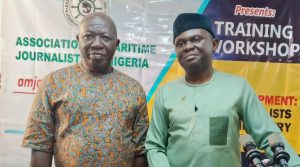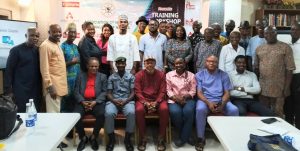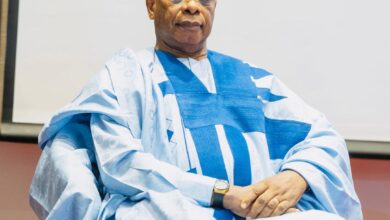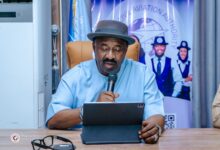
By Edu Abade
Stakeholders, businessmen, policy makers and government agencies in the Nigerian maritime industry have been urged to leverage the benefits of Special Economic Zones (SECs) and Free Trade Zones (FTZs), which have been identified as viable avenues to attract more Foreign Direct Investments (FDIs) into the country.
 The Public Relations Officer (PRO), Lagos Free Trade Zone Command of the Nigeria Customs Service (NCS), Abdullahi Lagos Abiola, who represented the National Public Relations Officer (NPRO) of the NCS, Abdullahi Maiwada, stated this during a training organized for newsmen by the Association of Maritime Journalists of Nigeria (AMJON) at the School of Eloquence in Lagos.
The Public Relations Officer (PRO), Lagos Free Trade Zone Command of the Nigeria Customs Service (NCS), Abdullahi Lagos Abiola, who represented the National Public Relations Officer (NPRO) of the NCS, Abdullahi Maiwada, stated this during a training organized for newsmen by the Association of Maritime Journalists of Nigeria (AMJON) at the School of Eloquence in Lagos.
Speaking on Understanding the New Nigeria Customs Service (NCS) Act 2023 and How it Will Enhance Economic Growth, Abiola said public relations remain crucial to any organization, adding that Comptroller Adewale Bashir Adeniyi’s rise to the Controller-General of Customs (CGC) remains a major source of motivation for serving junior public relations officers of the NCS.
Maintaining that economic growth depends largely on ease of doing business and adherence to the rule of law, among other factors, he said the NCS was generally shifting from over emphasis on maximum revenue generation and anti-smuggling to international best practices in customs operations.
“There is no need to be hostile in enforcing customs operational rules. More so, the Comptroller-General of Customs is aiming for civilized customs in Nigeria, by ensuring that officers move away from the old ways of doing things to international best practices and standards of doing things.
“The Nigeria Customs Service is also shifting from the outdated regulations and cumbersome operational models and encouraging businessmen and all stakeholders to be compliant traders. Sections 7, 14(5) and 18, which set up a governing board, funding sources for sustainability for Customs operations, are meant to improve standards and align with international best practices,” he stated.
He, however, disclosed that the NCS Act 2023 was facing some challenges including implementation huddles, expensive technology infrastructure, continuous comprehensive trainings for officers, vigilance against corruption and stakeholder engagement, among others, adding that in spite of the NCS’ emphasis on adequate revenue generation, it aims at simplifying trade operations that align with global trends and best practices.
During the training with support from the NCS, the Maritime Workers Union of Nigeria (MWUN) and the School of Eloquence, Abiola also urged stakeholders to leverage the Special Economic Zones and Free Trade Zones, as well as cooperation and collaboration for trade facilitation to attract higher FDIs and grow the national economy for the greater good of all citizens.
Also speaking, Dean, School of Eloquence, Dr. Ubong Essien, has urged them to enhance their reportage of the Nigerian Marine and Blue Economy and take advantage of the economic benefits inherent in the sector.
He said it was important for media practitioners to create wealth and prosper through effective and quality reporting of the Marine and Blue Economy, stressing that the maritime industry was not only about the sea and shipping and that the blue economy is vast to the extent that journalists could choose their areas of specialization to create wealth for themselves.
Essien maintained that journalists were as crucial to national development as their lawyers and oil workers counterparts and as such, they should be able to earn a decent living with regard to the basic provisions of life and being able to pay their bills comfortably, insisting that journalism and law professions remain sacrosanct in driving consciousness in the evolution of modern societies.
On his part, President of AMJON, Paul Ogbuokiri, who commended the management of the School of Eloquence for providing the facilities for the training programme, charged maritime journalists to update and upgrade their reportorial skills.
Ogbuokiri, who restated the association’s commitment to always ensure comprehensive reporting of the maritime industry, said members of the association have resolved to collectively pursue the School of Eloquence’s Master class programme.










